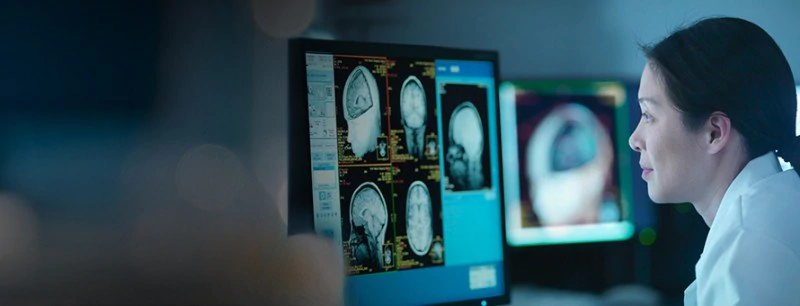
Redefine Your Future in Allied Health with a Health Science Degree Online
You're already making a difference through the work you love. Now take it to the next level with the online Bachelor of Science in Health Sciences from University of Michigan Science. It's a flexible, affordable and uniquely tailored way to build on the skills and experience you've acquired professionally and gain the knowledge to take on new challenges in your chosen clinical discipline.
Exclusively designed for professionals with an associate degree in the allied health field, UMS's transfer-friendly health science degree online is structured to maximize your transfer of credits for prior coursework - so you can make the most of what you've learned previously and take only the classes you need to obtain your bachelor's degree. At the same time, it lets you enrich your general knowledge base and develop further expertise in specific healthcare-related coursework, preparing you for success in supervisory and management roles.
See Yourself Succeed in Health Science
As an associate degree holder in the allied health discipline, you’re on the lookout for a credible and comprehensive bachelor’s program that maximizes your transfer of credit. UMS’s health science degree online, with its unique design, enables you to take greater advantage of prior learning, offering an exceptional opportunity for recognition of your associate degree credits.
The online bachelor’s in health sciences is designed to develop the skills you’ll need to advance in your field, with a focus on written and oral communication, computational skills, critical thinking, and societal and cultural context in seven essential core classes.
As a private, nonprofit university, UMS has one mission – to help you see yourself succeed. The benefits of earning your health science degree online at UMS include:
- Affordability. Take advantage of some of the most affordable tuition rates in the nation
- Convenience. Attend class when it’s convenient for you – online education means 24/7 access
- Efficiency and flexibility. Complete your undergraduate degree at your own pace, over six 8-week terms per year
- Expert instruction. Learn from instructors with relevant, real-world experience
- Networking. Tap into our nationwide network of alumni for internship and career opportunities
- Simple application process. Just fill out an online undergraduate application, and we’ll retrieve U.S. transcripts from your previous institutions and automatically complete an official credit evaluation. Plus, there’s no application fee
- Student support. Count on the ongoing support of dedicated academic and career advisors specialized in your area of study
- Transfer-friendly enrollment. Transfer up to 90 credits toward an undergraduate degree
Career Outlook
Align yourself with the increasing leadership opportunities in your field. According to the U.S. Bureau of Labor Statistics, an anticipated 20% increase in the need for medical health service managers by the year 2026 will intensify the importance of well-qualified, highly experienced individuals ready to meet those needs.*
The bachelor's program in health sciences will put you on a trajectory for success in a management or supervisory role in your chosen health-science field, including but not limited to:
- Cardiovascular technology
- Clinical laboratories
- Dental hygiene
- Diagnostic medical technology
- Medical assisting
- Medical office management
- Neurodiagnostic technology
- Nuclear medicine technology
- Occupational therapy
- Physical therapy
- Radiography
- Radiation therapy technology
- Respiratory therapy
- Sonography
- Surgical technology
This degree does not lead to licensure in any allied health field. It is designed to provide the non-clinical management skills in many allied health fields.
Curriculum
Courses To Prepare You For Your Career
UMS's bachelor's in health sciences program includes:
- General education
- Degree-specific courses
General Education Program
Our programs are designed to equip you with the skills and insights you need to move forward. In recent years, employers have stressed the need for graduates with higher order skills - the skills that go beyond technical knowledge - such as:
- Writing
- Communication
- Analysis
- Problem solving
All bachelor's students are required to take general education classes. Through foundation, exploration and integration courses, students learn to think critically, creatively and collaboratively, giving you the edge employers are looking for.
Courses May Include
Program Outcomes
- Engage diverse health care stakeholders using communications that reflect keen interpersonal skills, effective collaboration practices, and deep cultural competence
- Demonstrate knowledge of microeconomic, macroeconomic and financial principles through monitoring and utilization of financial and economic data for decision-making and strategic planning
- Utilize principles and functions of management to foster organizational development, promote effective use of human resources, and enhance operations
- Assess contemporary policies, regulations, and governance structures relevant to the United States health care delivery system and their implications for ethical decision-making
- Promote dynamic organizational cultures that establish strategic visions, methodically analyze and interpret data based on sound epidemiological and statistical principles, and embrace change for continuous health care quality improvement
- Demonstrate the application of healthcare management principles to improve the delivery of patient care within their technical discipline/department


